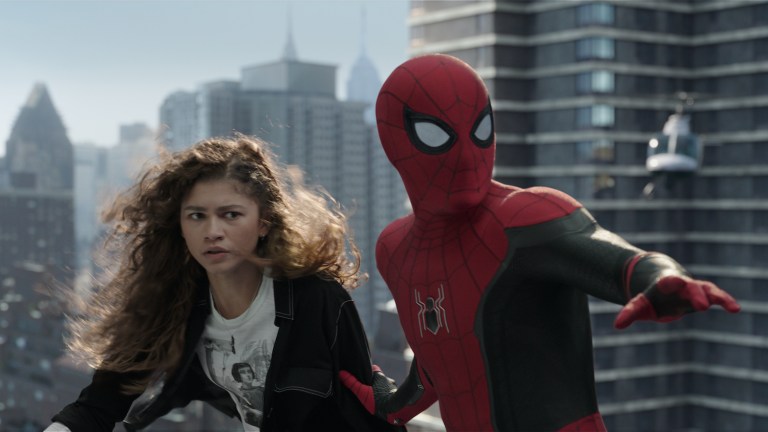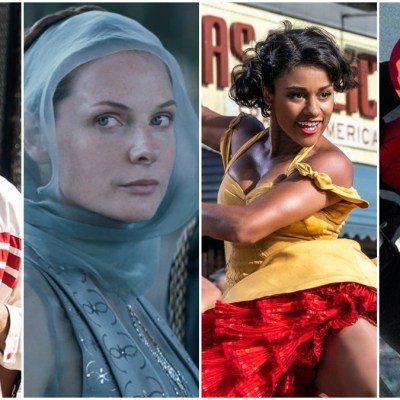Is the Oscars Campaign for Spider-Man: No Way Home for Real?
The Academy has been accused of ignoring superhero movies until Black Panther changed Oscars history. Is it Spider-Man's moment next?

This article contains Spider-Man: No Way Home spoilers.
“A young man’s heroic actions and resultant celebrity status bring unwanted consequences for the lives of the people he loves the most. But his efforts to change that only result in a dangerous, unstable situation that may threaten them all. With the help of two strangers with whom he shares more than he cares to admit, he realizes that only a supreme personal sacrifice may alter the course of events.”
Sounds like a hell of a story, huh? Perhaps a psychological thriller, a wartime melodrama, or even a tragic medical drama. Something with urgency, strong themes of friendship, loyalty, and responsibility, and perhaps an emotional climax that will send audiences out of the theater both inspired and saddened. In other words, the kind of movie that the Academy of Motion Picture Arts and Sciences has often showered with Oscars in the past.
But since this is the basic plot of Spider-Man: No Way Home–minus some of the more fantastical trappings–there’s almost no chance that the Academy will bestow nominations of any kind on Tom Holland’s third standalone outing as Spidey, except for the usual technical nods. Anything along the lines of, say, Best Actor, Best Supporting Actor (perhaps for Alfred Molina’s superb return as Doc Ock), Best Director, Best Adapted Screenplay or, dare we say it, Best Picture is about as remote a possibility as Peter Parker having a quiet drink somewhere with Thanos to smooth things over.
Or is it?
Sony Pictures and Marvel Studios, collaborators on the Holland trilogy of Spider-Man movies, are mounting an Oscar campaign for the film, creating “For Your Consideration” ads targeted at Academy members and voters. They’re asking voters to consider the film in “all categories,” which would include the ones we listed above. How far they take the campaign, and whether it gets any traction with the voters, remains to be seen, but for the present, it’s happening.
The question is whether the Academy is finally taking superhero movies seriously as the kind of quality cinematic material that deserves awards recognition. Following the now legendary snub of The Dark Knight in 2009 for Best Picture and its director, Christopher Nolan, for Best Director, the narrative had been that the Academy and the filmmaking community just didn’t deem these movies worthy of consideration for any of the major “above the line” awards–with the occasional exception like Heath Ledger’s posthumous win for Best Supporting Actor in The Dark Knight or the surprising Best Adapted Screenplay nomination for 2017’s Logan.
Without taking anything at all away from Ledger’s brilliant performance, one could argue that his untimely death made him the emotional favorite that year. A similar caveat could be applied to Black Panther, which rode its groundbreaking Afro-centrism and incredible cultural impact all the way to a Best Picture nomination. But it’s notable that its other six nominations were all music or production-related (of which it won three). Where were the nods for Chadwick Boseman, Michael B. Jordan (or any of the supporting cast), or director Ryan Coogler?
The case of Joker may be the closest indicator so far that the Academy is changing its ways. The grimdark origin story for the Clown Prince of Crime was nominated for an astounding 11 Oscars, including Best Picture, Best Director for Todd Phillips, Best Adapted Screenplay for Phillips and Scott Silver, and Best Actor for Joaquin Phoenix. It won two, including Phoenix’s well-deserved prize and Best Original Score. And yet Joker was not seen as a “typical” comic book movie, with critics treating it as a serious look at mental illness and toxic masculinity, while Academy voters recognized the DNA of classic Martin Scorsese films like Taxi Driver and The King of Comedy. It was arguably recognized more for deliberately stepping away from its roots.
Spider-Man: No Way Home faces a scenario in which the film may be honored for nearly single-handedly keeping the movie theater business alive in the dark days of late 2021 and early 2022 as the Omicron variant of COVID-19 ravaged the country. The three Peter Parkers, Doctor Strange, Doc Ock, Aunt May, and all the rest are literally keeping the lights on at multiplexes across the nation, with people arguably risking their lives to see this film as Oscar contenders like King Richard, West Side Story, Nightmare Alley, The Power of the Dog, and The Lost Daughter either play to empty auditoriums or stream to unknown numbers of home viewers on Netflix and the like.
The Academy may see fit to pay tribute to No Way Home for that reason alone, plus the fact that nominations for the biggest movie of the year and the only theatrical release that became a genuine cultural event during the pandemic would potentially do a lot to boost the hideously sinking ratings of the Oscar ceremony itself. News has also come to light that the Academy has even explored having Tom Holland host the event, further strengthening Spidey’s presence.
But aside from the circumstances surrounding its release and its undeniable impact on a pandemic-torn marketplace, does No Way Home deserve to be nominated or even win for any of the headlining awards based solely on the merits? That’s subjective, of course, but this writer would argue that there’s a very good case to make for Holland to get a Best Actor nod, and either Molina or Andrew Garfield to make the list for Best Supporting Actor.
A Best Adapted Screenplay nomination isn’t out of the question either: the work by credited writers Chris McKenna and Erik Sommers–balancing three Spider-Men and five villains, along with supporting personnel May, MJ, Strange and Ned, giving everyone something to do and a character arc while also incorporating concepts like the multiverse plus powerful emotional and thematic beats–is as good as, if not better than, the writing for any number of “prestige” films that don’t feature grown men swinging on webs or brandishing mechanical tentacles.
Best Picture or Best Director? As capable as Jon Watts is, there’s nothing truly exceptional either visually or esthetically about No Way Home to warrant a special nod for him. As for Best Picture, the last time the third movie in a series was nominated–The Lord of the Rings: The Return of the King in 2004–it won not just Best Picture, but everything else it was up for. Again, however, there was a sense that the Academy wanted to honor Peter Jackson and company for the sheer achievement of getting the Tolkien classic onto the screen as a whole, across three films shot back-to-back, and not for the individual merits of the final chapter.
No Way Home did not get recognition for its ensemble cast in the just-announced Screen Actors Guild award nominations–usually a strong bellwether of the Oscars, as it’s often indicative of what the overlapping actors wing of the Academy is thinking. But our intuition tells us something similar to the LOTR situation is afoot: even if No Way Home makes it to one or more of the major categories, that will be more about the Academy acknowledging its enormous popular appeal and less about the quality of the work itself.
In this case, the work arguably does deserve such consideration. That’s the next line for the Oscars–and still quite a few film observers and critics–to cross: an acceptance that superhero movies, just like horror or sci-fi films, can be superb filmmaking and storytelling on their own terms, as well as box office saviors and populist crowdpleasers.
Spider-Man: No Way Home is now playing in theaters.


